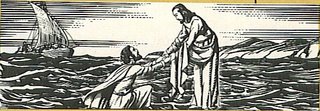Christ Walks on the Sea

Chapter 40
MATT. 14:22-36; MARK 6:45-56; JOHN 6:l6-21
KNOWING THAT THE MULTITUDE which He had fed wished to make Him a king by force, Jesus had His disciples embark for Galilee. Then He dismissed the crowds and went up on the hillside, where He remained praying far into the night.
The disciples had made slow progress in their crossing, for the wind was against them. About four o'clock in the morning, when they had rowed some two-and-a-half or three miles, Jesus approached their boat, walking toward them on the sea. When the disciples saw this figure striding across the waves, they were frightened and cried out that it was a ghost, for it was still dark and they did not recognize their Master. But Jesus called to them:
"Take courage; it is I, do not be afraid."
"Lord," Peter shouted, "if it is Thou, bid me come to Thee over the water." And Jesus answered:
"Come."
Peter dropped over the side and walked a few steps toward Jesus. Then his fear overcame him, and feeling himself sinking, he cried out, "Lord, save me." Jesus stretched out His hand and bore him up. And He said:
"O thou of little faith, why didst thou doubt?"
Peter and Jesus then entered the boat, and as soon as the Master was aboard the wind fell. The other disciples crowded around Jesus and adored Him, saying, "Truly, Thou art the Son of God." In their imperfect faith, they had not appreciated the significance of the multiplication of the loaves, but this new miracle left no room for doubt in their hearts.
Shortly after Christ boarded the craft, they landed on the Genesar shore, near Capharnaum. Though it was quite early in the morning, there were already some men down at the shore, and as soon as they recognized Jesus they hurried off to bring their sick for Him to heal. As He and His band went on toward Capharnaum, in every farm and village along the route the sick were brought out on their pallets and placed where He would see them. They begged Him to let them just touch the tassel of His cloak; and as many as did so were healed.

When it was dark, when the wind was contrary, when they were being tossed by the rough waters, when they were weary from rowing and were making no progress, when they felt alone and left to their own resources —it was then that Christ appeared to His Apostles. He calmed the waters, and they easily reached the shore. This is the typical action of Our Lord, to bring peace and quiet to those who are troubled. That is what He will do for us, also.





